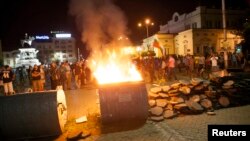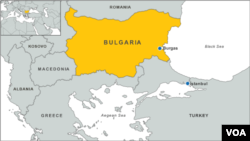LONDON —
The president of Bulgaria has made an appeal for calm after more than 40 days of protests escalated Tuesday. Demonstrators blockaded parliament, trapping more than 100 people inside.
Protesters have been carrying out peaceful demonstrations in Bulgaria for five weeks. But overnight Tuesday the situation escalated.
Hundreds of protesters barricaded the parliament in Sofia, trapping more than 100 people inside for more than seven hours. Anti-riot police finally broke up the barricade in the early hours of Wednesday morning.
Georgi was one protester on the streets of Sofia. "This government should resign immediately. If it does not than the 40 days of peaceful protests are enough. From now on the situation might get critical," he said.
The current government has only been in power since May. The previous government was forced to resign in February following protests over poverty and corruption.
Fresh protests began in mid-June after the government appointed a powerful media magnate to the post of security chief. The decision was quickly reversed, but the protests persisted with demonstrators demanding fresh elections.
Francois Frison-Roche is a senior researcher at the University of Paris.
“Really I think that the government is going to resign sooner or later. This government does not represent the will of the majority of the people,” said the researcher.
He said Bulgarian politicians needed to learn how to react to popular protest in a democratic way.
“Bulgaria is a young democracy. The political elite has to learn how to react to such protests. And the European Union is certainly going to give some advice. I think also that Bulgaria needs European funds and the political elite is going to realize that very quickly,” said Frison-Roche.
Bulgaria joined the European Union in 2007. EU Justice Commissioner Viviane Reding was in Bulgaria on Tuesday and voiced her support for the protests.
She acknowledged concerns raised by some that EU regional aid has been misspent in Bulgaria and said she would be assessing the situation further.
London School of Economics Bulgaria expert Will Bartlett said the main cause of unrest was not political, but economic.
“Corruption has been there all the time. What is new is the economic crisis and I think that is what is really behind the political unrest. Corruption is basically one symptom of that in terms of mobilizing people to mobilize against government,” he said.
Bulgaria is the Union’s poorest country. Poverty has been made worse by the Europe-wide economic crisis, which has meant demands for exports have been low and there has been a significant drop in foreign direct investment. Banking credit has become increasingly difficult to secure and unemployment is on the rise.
Bulgaria is not part of the European single currency and has not received the types of bailout packages awarded to other struggling economies, like Greece and Portugal.
But Bartlett said European countries that were not part of the euro zone were also deeply impacted by the continent’s economic woes. Right now, he said, the country needed the Union’s support.
“Really it needs some patience to develop and assistance to develop and become part of the EU community,” said Bartlett.
According to the latest Global Corruption Barometer published by corruption watchdog Transparency International, the highest level of corruption in Bulgaria is found in the judiciary, followed by the health sector.
Protesters have been carrying out peaceful demonstrations in Bulgaria for five weeks. But overnight Tuesday the situation escalated.
Hundreds of protesters barricaded the parliament in Sofia, trapping more than 100 people inside for more than seven hours. Anti-riot police finally broke up the barricade in the early hours of Wednesday morning.
Georgi was one protester on the streets of Sofia. "This government should resign immediately. If it does not than the 40 days of peaceful protests are enough. From now on the situation might get critical," he said.
The current government has only been in power since May. The previous government was forced to resign in February following protests over poverty and corruption.
Fresh protests began in mid-June after the government appointed a powerful media magnate to the post of security chief. The decision was quickly reversed, but the protests persisted with demonstrators demanding fresh elections.
Francois Frison-Roche is a senior researcher at the University of Paris.
“Really I think that the government is going to resign sooner or later. This government does not represent the will of the majority of the people,” said the researcher.
He said Bulgarian politicians needed to learn how to react to popular protest in a democratic way.
“Bulgaria is a young democracy. The political elite has to learn how to react to such protests. And the European Union is certainly going to give some advice. I think also that Bulgaria needs European funds and the political elite is going to realize that very quickly,” said Frison-Roche.
Bulgaria joined the European Union in 2007. EU Justice Commissioner Viviane Reding was in Bulgaria on Tuesday and voiced her support for the protests.
She acknowledged concerns raised by some that EU regional aid has been misspent in Bulgaria and said she would be assessing the situation further.
London School of Economics Bulgaria expert Will Bartlett said the main cause of unrest was not political, but economic.
“Corruption has been there all the time. What is new is the economic crisis and I think that is what is really behind the political unrest. Corruption is basically one symptom of that in terms of mobilizing people to mobilize against government,” he said.
Bulgaria is the Union’s poorest country. Poverty has been made worse by the Europe-wide economic crisis, which has meant demands for exports have been low and there has been a significant drop in foreign direct investment. Banking credit has become increasingly difficult to secure and unemployment is on the rise.
Bulgaria is not part of the European single currency and has not received the types of bailout packages awarded to other struggling economies, like Greece and Portugal.
But Bartlett said European countries that were not part of the euro zone were also deeply impacted by the continent’s economic woes. Right now, he said, the country needed the Union’s support.
“Really it needs some patience to develop and assistance to develop and become part of the EU community,” said Bartlett.
According to the latest Global Corruption Barometer published by corruption watchdog Transparency International, the highest level of corruption in Bulgaria is found in the judiciary, followed by the health sector.





